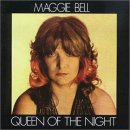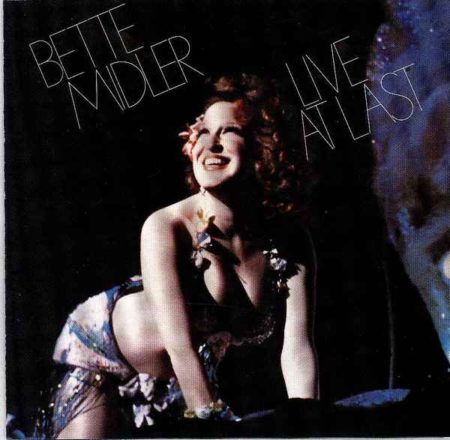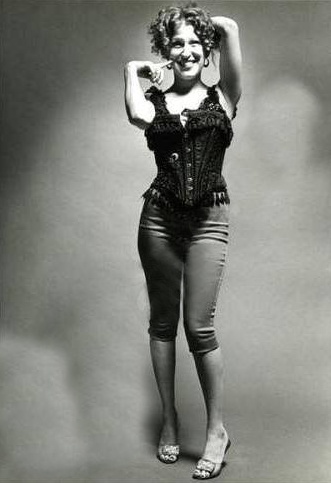
Mister D: I had forgotten how good this album is. The reviewer is dead on. I would have loved to have heard Miss M tackle Tradewinds or As the Years Go Passing By …if you listen to these tracks you’ll understand…Eventually, Bette did go on to add Oh My My to her live act….Ms. Bell also mentions Bette in the liner notes. She was quite thrilled that Bette said it was one of the best solo albums by a female that she had ever heard….
Maggie Bell
Queen of the Night
THE ROLLING STONE REVIEW
After several false starts, Maggie Bell, Britain’s widely proclaimed best
female vocalist for the past two years, has made an album which confirms her
reputation. Now, she must face the inevitable comparisons, particularly with
the presence of Aretha Franklin and the ghost of Janis Joplin. Her voice
isn’t nearly so coarse, though it may be as powerful. Queen of the Night has
much more in common with the gospel-soaked soul of Aretha Franklin’s Spirit
in the Dark period-though Bell’s voice is not nearly so perfect.
But the Joplin ethos is among rock’s most powerful necrophilic myths. Queen
of the Night’s cover, showing a tawdry Bell, can’t help but summon memories
of Joplin’s final grand album. Neither can her recording of “A Woman Left
Lonely,” a song that Joplin overcame with sheer energy. (I don’t think
Joplin’s reading of the Dan Penn/Spooner Oldham lyrics was as sensitive as
Charlie Rich’s. But the song enhanced the myth-the title encapsulated her
tragedy.)
Musically the song cries out for Bell’s control, and her interpretation owes
as much to Rich as Joplin. Still, she doesn’t defeat the comparison, only
circumvents it. For me, Bell’s version isn’t a mistake, but a challenge well
met. Though it does indicate that she aspires to fill Janis Joplin’s role in
rock. And I think she does so with some success, but it is a hard act to
follow. Too many new Dylans have expended their resources in a single album
for anyone to feel completely comfortable with such an outburst.
Jerry Wexler and Antisia Music (the latter has credits with both Aretha
Franklin and Roberta Flack; the former has made more good records with women singers than anyone else in rock) present Bell’s voice in an almost
perfectly appropriate context. I presume their production includes the
nearly flawless selection of material. No one since Rod Stewart has been
blessed with such a wealth of gems. “After Midnight” and “Oh My My” are
particularly inspired, though Ringo Starr’s current success with “Oh My My”
probably precludes the release of this superior version as a single.
Atlantic’s rhythm section is as rock solid and driving as ever. In concert,
Stone the Crows, Bell’s earlier group, were competent but unexciting; on
record, they were clumsy and heavy-handed. Here, well-known New York soul
sessionmen like Cornell Dupree, Hugh McCracken, Richard Tee push Bell past
her previous accomplishments, simply because they’re always at least as good
as she is. And sometimes, as on “After Midnight,” they’re the show.
In another way, Bell exerts the control of still another member of the rock
demimonde: Bette Midler. Side Two is filled with the sort of post-rock pop of which Midler is allegedly the best interpreter. While probably true,
Bell’s approach is not so pretentious. In many ways, this is the album The
Divine should have made: “Trade Winds” is so close to the potential of her
style that it is embarrassing-but not to Maggie Bell.
Such songs are worth the commitment. She presents them not as curiosities of
camp, nor as simple pop (something Franklin can do that Bell probably can’t)
but as rock-inflected pop. The distinction is crucial: Bell knows how to
turn pop into blues in the way that almost everyone else seems to have
forgotten (or, as in Franklin’s case, discarded). I’m particularly impressed
by her approach to John Prine’s “Souvenirs,” which is given a Stax horn
track, and Peter Allen’s “The Other Side.” He’s a better composer, much
closer to rock, than anyone has previously shown.
Still, I wonder whether Bell can sidestep Joplin’s poltergeist. Ghosts are
often best met through confrontation. If Maggie Bell makes another album
this good, her problem will become living up to her own reputation. (RS 159)
DAVE MARSH






